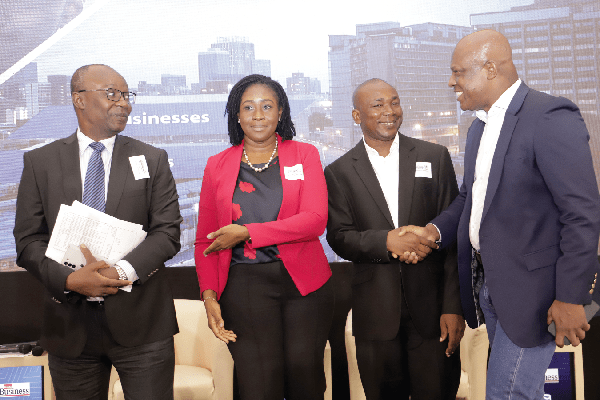The Graphic Business/Stanbic Bank breakfast meeting brought together some of the intelligent brains in the country to brainstorm on how to avoid a return to IMF.
For the fourth time this year, the meeting was held on the theme; “17 Times too many! What do we need to stop doing and start doing as a people?”
The panel of discussion featured a Professor of Finance, Prof. Godfred Alufar Bokpin; the Greater Accra Regional Chairman of the Association of Ghana Industries (AGI), Tsonam Cleanse Akpeloo, and a chartered accountant, Dr Valentine Kwasi Mensah.
It was chaired by an economist from the Economics Department of the University of Ghana, Legon, Dr Priscilla Twumasi Baffour.
The forum gave the expert panel and participants the opportunity to deliberate on the topic of interest pertaining to the factors that pushed the country into the arms of the International Monetary Fund (IMF) on 17 occasions and how it can avoid a return.
It followed ongoing efforts by the government to close a deal with the IMF to help stabilise the economy.
Experts Views
According to Ato Afful, Managing Director (MD) of the Graphic Communications Group Limited (GCGL), agriculture and its value chain is a lever to stimulate the rest of the economy. He urged the government to use the impending IMF programme to revamp the economy around agriculture and agro-processing to make it more sustainable.
“Agriculture broadly, and agri-processing specifically, can act as a lever to assist in stimulating the rest of the economy because it creates demand for fixed goods, public goods, road networks, infrastructure, such as storage facilities, processing plants, harbours, among others.
“Agriculture can act as a catalyst to stimulate investment in these sectors, which will trigger other sectors in the various communities. My view is, and it is invariably proven: when people are fed and kept busy, the noise will be filtered out. We need a lifestyle change, backed by real commitment and an endurance to stick to a plan that delivers this mandate.”
Atto Afful, Managing Director (MD) of the Graphic Communications Group Limited (GCGL)According to the the Chairperson of the event, Priscilla Baffour, she stated it is not surprising that the country was on the verge of its 17th programme since 1966. It was obvious that the country needed to build a resilient import-substitution economy to be able to wean itself off IMF programmes.
“I believe the buck stops with leadership,”
Dr BaffourAccording to Godfred Bokpin, he explained that although the country’s tax-to-Gross Domestic Product (GDP) ratio was low, compared to its peers on the continent, the issue had more to do with compliance and not policy.
“Our tax-to-GDP ratio is less than 13 per cent, so considerably one would logically suggest that we introduce new taxes. But I will say no. If you look at our tax potential, we can do between 24 and 25 per cent of GDP.”
Prof. Godfred Alufar Bokpin
According to Oteng Kumah, who is an international economic consultant, he called for an independent body of experts to help instill fiscal discipline by ensuring that the government strictly complied with its economic programme.
“Whenever we have a programme with IMF, we always behave but when we go outside the programme, our fiscal situation misbehaves. So, clearly, there is something that we need to institutionalize.
“I do not know where you will put this organization but we need something, maybe extra presidential, that says that after a programme, it will have the authority to look at every budget and programme to make sure that all targets are met. That to me, is our major problem,”
Dr Oteng KumahREAD ALSO: Government Contemplates Banning All Small Scale Mining Activities in Forest Reserves




















